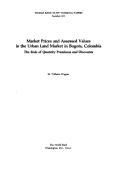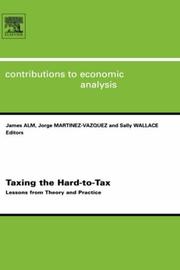| Listing 1 - 4 of 4 |
Sort by
|
Periodical
ISSN: 21685878 Year: 1994 Publisher: Chicago, IL : International Association of Assessing Officers,
Abstract | Keywords | Export | Availability | Bookmark
 Loading...
Loading...Choose an application
- Reference Manager
- EndNote
- RefWorks (Direct export to RefWorks)
Tax assessment --- Property tax --- Periodicals --- Recht. --- Belastingrecht. --- Electronic full-text. --- Property tax. --- Tax assessment. --- Assessed valuation --- Assessment --- Assessment, Tax --- Real property tax --- General property tax --- Taxation of property --- Tax administration and procedure --- Taxation --- Wealth tax --- Capital levy --- Évaluation --- Impôt sur la fortune --- Real Estate, Housing & Land Use --- Assiette de l'impôt

ISBN: 0821303899 Year: 1984 Publisher: Washington (D.C.) World Bank
Abstract | Keywords | Export | Availability | Bookmark
 Loading...
Loading...Choose an application
- Reference Manager
- EndNote
- RefWorks (Direct export to RefWorks)
Real property --- Tax assessment --- 332.2 --- Assessed valuation --- Assessment --- Assessment, Tax --- Property tax --- Real property tax --- Tax administration and procedure --- Cadastral surveys --- Catastral surveys --- Freehold --- Limitations (Law) --- Property, Real --- Real estate --- Real estate law --- Realty --- Property --- Rent --- 332.2 Grondbezit. Onroerende goederen --(economische structuur) --- Grondbezit. Onroerende goederen --(economische structuur) --- Prices --- Valuation --- Law and legislation --- Zonder onderwerpscode

ISBN: 0444516778 9786611027407 1849508283 1281027405 0080547613 9781849508285 9780444516770 Year: 2004 Volume: 268 Publisher: Amsterdam ; Boston : Elsevier,
Abstract | Keywords | Export | Availability | Bookmark
 Loading...
Loading...Choose an application
- Reference Manager
- EndNote
- RefWorks (Direct export to RefWorks)
The goal of this edited volume is to take a hard, objective look at the many different aspects of taxing the hard-to-tax, as well as the many different approaches that have been employed around the world. In the developed and developing world, taxing certain kinds of activities, sectors, or individuals - the so-called hard-to-tax - is a challenge for governments. In the past, the practical side of this issue has received some attention, mainly from those working in the trenches of tax administration. There has also been some analytical work on such things as presumptive taxation, as well as some empirical work on measuring the hard-to-tax. However, the lessons from all of this work have been very unevenly disseminated, and there are clearly many unresolved issues. With the steady advance of such things as globalization, internet commerce, and tax shelters, the issues in taxing the hard-to-tax will become even more pressing.
Taxation. --- Tax evasion. --- Tax assessment. --- Tax collection. --- Impôt --- Fraude fiscale --- Assiette de l'impôt --- Recouvrement --- Collection of taxes --- Tax delinquency --- Taxes, Collection of --- Tax administration and procedure --- Taxpayer compliance --- Assessed valuation --- Assessment --- Assessment, Tax --- Property tax --- Real property tax --- Evasion, Fiscal --- Fiscal evasion --- Tax avoidance --- Tax-dodging --- Tax fraud --- Taxation --- Taxation, Evasion of --- White collar crimes --- Duties --- Fee system (Taxation) --- Tax policy --- Tax reform --- Taxation, Incidence of --- Taxes --- Finance, Public --- Revenue --- Evasion --- Mathematics --- Business & Economics --- Monetary policy. --- Mathematical analysis. --- Mathematical Analysis. --- Money & Monetary Policy. --- 517.1 Mathematical analysis --- Mathematical analysis --- Monetary management --- Economic policy --- Currency boards --- Money supply
Book

ISBN: 3319323946 3319323938 Year: 2016 Publisher: Cham Springer Nature
Abstract | Keywords | Export | Availability | Bookmark
 Loading...
Loading...Choose an application
- Reference Manager
- EndNote
- RefWorks (Direct export to RefWorks)
Provides an overview of current research on a variety of topics related to both large-scale and classroom assessment. First, the purposes, traditions and principles of assessment are considered, with particular attention to those common to all levels of assessment and those more connected with either classroom or large-scale assessment. Assessment design based on sound assessment principles is discussed, differentiating between large-scale and classroom assessment, but also examining how the design principles overlap. The focus then shifts to classroom assessment and provides specific examples of assessment strategies, before examining the impact of large-scale assessment on curriculum, policy, instruction, and classroom assessment. The book concludes by discussing the challenges that teachers currently face, as well as ways to support them. The book offers a common language for researchers in assessment, as well as a primer for those interested in understanding current work in the area of assessment. In summary, it provides the opportunity to discuss large-scale and classroom assessment by addressing the following main themes: Purposes, Traditions and Principles of Assessment ;Design of Assessment Tasks ;Classroom Assessment in Action ;Interactions of Large-Scale and Classroom Assessment ;Enhancing Sound Assessment Knowledge and Practices. It also suggests areas for future research in assessment in mathematics education.
Education. --- Mathematics --- Teaching. --- Assessment. --- Mathematics Education. --- Assessment, Testing and Evaluation. --- Learning & Instruction. --- Teaching and Teacher Education. --- Study and teaching. --- Didactics --- Instruction --- Pedagogy --- School teaching --- Schoolteaching --- Children --- Education, Primitive --- Education of children --- Human resource development --- Schooling --- Students --- Youth --- Education --- Instructional systems --- Pedagogical content knowledge --- Training --- Civilization --- Learning and scholarship --- Mental discipline --- Schools --- Teaching --- Mathematics. --- Educational tests and measuremen. --- Educational tests and measurements. --- Educational assessment --- Educational measurements --- Mental tests --- Tests and measurements in education --- Psychological tests for children --- Psychometrics --- Examinations --- Psychological tests --- Math --- Science --- Rating of --- Mathematics—Study and teaching . --- Learning. --- Instruction. --- Learning process --- Comprehension --- Mathematics Education --- Learning --- Tax assessment. --- Assessed valuation --- Assessment --- Assessment, Tax --- Property tax --- Real property tax --- Tax administration and procedure --- EDUCATION / Teaching / Subjects / Mathematics. --- mathematics education --- learning --- teaching
| Listing 1 - 4 of 4 |
Sort by
|

 Search
Search Feedback
Feedback About UniCat
About UniCat  Help
Help News
News